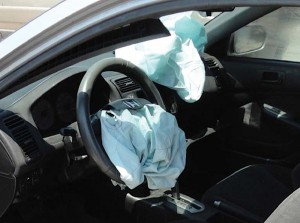The recall crisis that reached record levels last year has continued to hammer the auto industry, as Honda shows with the release of its weak, January-to-March earnings report.
The recall of vehicles equipped with potentially faulty Takata airbags led to a 43% year-over-year decline in the maker’s bottom line for the fourth quarter of its fiscal year. At $814 million, or 45 cents per share, the net income was well short of the market forecast of 59 cents a share, according to Zacks Consensus Estimate.
But Honda laid out a more upbeat forecast for the year ahead, projecting a nearly 10% increase in revenues and a more modest 0.4% increase in net income for the 2016 fiscal year.
(Ford sales, earnings miss the mark for Q1. Click Here for the story.)
The auto industry set an all-time record for recalls last year, with more than 60 million vehicles impacted in the U.S. alone. The pace has slowed only slightly this year, in part due to ongoing problems with Takata airbags. For reasons yet to be explained, the bags can, at times, inflate far too aggressively when triggered by a collision, spewing shrapnel into the passenger compartment. The problem so far has been linked to at least four deaths in the United States caused.
At least 10 automakers in the U.S. market have had to order recalls due to the suspect bags, including Toyota, General Motors and BMW. But Honda, which has a longstanding relationship with Takata, was affected the most by the problem, recalling millions of vehicles due to the defect. It has, in fact, called back even more vehicles than the supplier has recommended.
Takata is in an ongoing dispute with the National Highway Traffic Safety Administration. The government wants all vehicles using the suspect bags recalled while the supplier insists only those sold in states with high humidity need be covered. There is some evidence the problem is more severe in such locations. Honda is one of several makers voluntarily following the broader NHTSA recommendation, a factor that was clearly seen in its fourth-quarter earnings report.
But the maker says it was helped by the drop in the value of the Japanese yen against the strong American dollar.
(GM Q1 earnings miss the mark. For more, Click Here.)
And Honda has been gaining traction in the Asian market, including China where Japanese makers have been struggling in recent years.
While earnings slipped, Honda did see an increase in revenues, which jumped 8.3%, to $27.91 billion. Much of that can be credited to strong demand for the Japanese company’s motorcycle operations, noted Zacks researchers. But automobile sales were up 6.2%, to $21 billion, as well.
For the coming fiscal year, Honda expects to earn $4.57 billion, or $2.53 a share, a 0.4% increase. It also expects revenues to rise 9.5%, to $120.4 billion.
Honda was just one of several major global automakers to report disappointing numbers for the latest quarter. On Tuesday, Ford Motor Co. said its earnings were down 6.5%, to $924 million. General Motors last week also came in lower for the first quarter.
But Daimler AG reported on Tuesday that its earnings nearly doubled. And Volkswagen AG today announced strong Q1 earnings, as well.
(For more on Daimler’s strong numbers, Click Here.)


From now on all major auto makers will be taking a big financial hit every year to address product defects. This should illustrate the advantage of better designs and quality control, which can save an auto makers hundreds of millions per year. The lowest bidder might not be the best choice if they can’t maintain proper quality control.